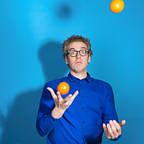FPS #1 - Beyond insights: what can you learn through User Research ?
How User Research can help you move from guessing to fact-based decisions, reduce cognitive bias and solve problems for real people.
This post is part of a series on “Future Proof Skills”: skills workers in all industries need to develop to create future proof organisations .
User Research is one of the fundamental skills for anyone willing to develop or improve products or services that solve real problems for real people.
User Research is mostly used by product and marketing teams in charge of developing and improving products and services, but it can also help strategists in any position to take fact-based decisions about new products or even new internal policy and processes aiming at improving employees satisfaction or supporting behavioural change.
Conducting User Research doesn’t mean doing everything user says, it means grounding a vision into facts and move from pure intuition to facts-based decisions making.
What is it about ?
User Research is the process of applying research techniques to the understanding of User’s practices, behaviours, struggles, pain points, aspirations and expectations. The main goal of User Research is to understand why these behaviours and practices take place, not (as in market research) how many people are concerned.
The skills mastered by User Researchers include: scoping and planning research and users recruitment, conducting field observations, conducting user interviews and group discussions, analysing qualitative and quantitative data, generate insights and define product design or improvement recommendations.
In a project, the sooner you do User Research the better. But User Research shouldn’t be limited to the early stages of a project.
As shown in this graphic from Tomer Sharon, you should ask questions about users at every stage of project and product development.
The only thing that changes are the kind of questions you address.
User Research also helps unveiling opportunities for new products or services you didn’t plan for. While you try to understand a certain behaviour and practice to rient the design of a product it’s quite common to discover opportunities for a new problem to solve.
Why does it matter ?
The benefits of User Research are often resumed to insights on user behaviours and expectations. While insights are certainly part of the results of user research there are more actionable outcomes you can expect:
- Understand the Job to be done: when interviewing users about the way they currently solve a problem you will understand what really matters for them and what is the “job” the ideal solution should do for them. The classic example of job to be done is the one of commuters buying milkshakes to keep them company while driving.
- Move from guessing to fact-based decisions: User Research helps you take decisions based on the observation of users’ behaviour. The analysis of human behaviour is far from being an exact science but when it comes to deciding which products or features to develop, user research helps being more objective than competitive benchmarks or pure intuition. As Feynman quoted by Jeff Gothelf would say “No matter how beautiful your theory is, If it doesn’t correspond to experience, it’s wrong”
- Reduce cognitive biases: Human judgements are full of biases.
An example is “The availability heuristic bias” a mental shortcut that occurs when people make judgments about the probability of events on the basis of how easy it is to think of examples. The availability heuristic operates on the notion that, “if you can think of it, it must be important.” (Wikipedia). User Research help you take a step back and question your own beliefs by confronting them to the observation of behaviour.
Tips for conducting User Research
Here are some tips if you are doing or willing to do User Research on your own:
- Be aware of your biases and expect to be wrong.
- Listen and observe everything not only what confirms your intuitions.
- Separate your questions from the questions you will ask to users: asking “how much would you pay for it” is not the best way to know how much users will pay for your service.
Asking “Do you know how much time and money do you spend today by not solving this problem” is a better option. - Address your known unknown but be curious and be open to discover unknown unknown: when you talk to users you expect to learn about something you didn’t know before. But you will also learn a lot about things you didn’t expect to learn. Don’t ignore them !
Further readings
Three things you can read to go further on the topic:
- Tomer Sharon book and Medium. Tomer is a pioneer in User Research methods and today leads User Research & Metrics at Goldman Sachs.
- Steve Portigal books. Steve is founder of Portigal.com an independent consultancy.
- Jobs to be done, an article by Clayton M. Christensen, Taddy Hall, Karen Dillon and David S. Duncan
Join our training on User Research !
To give you an hands-on perspective on User Research we developed a training (ENG - FR) with Alessandro Catania, Head of User Research at Air Liquide and previously User Research Director at Attoma.
Alessandro has 10 years experience in both B2C and B2B User Research for both product development and Innovation strategy.
During the training you will learn how to plan your User Research activity and which techniques to use for the best outcome. You will immerse yourself in User Research activities and learn how to convert insights into action through practical team activities.
All the dates and details are here (english here)
Join us and start improving your User Research skills today !
